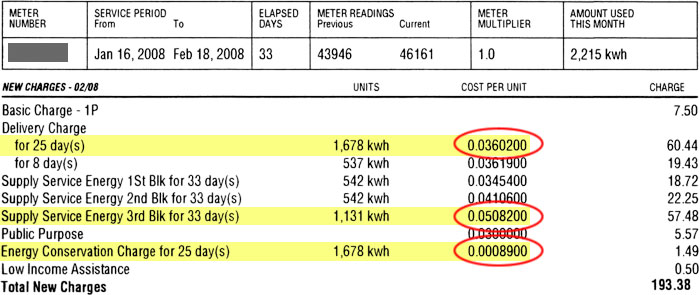This guide is intended to help you get the most accurate evaluation of how much electricity costs you per unit. If you are looking for an easier method, we have 3 different guides to choose from listed here. However, for our example power bill below both of the power bill based methods yield a very similar result.
If you are unsure what a kilowatt hour is, then you may want to read What is A Kilowatt Hour first.
The electric company charges you for power in blocks. Each block costs more than the previous. This guide assumes the following:
Since we are calculating the cost of items that we have control over, we have to base the calculation on the highest dollar value that we pay the electric company.
Items You are Charged For
Most power companies charge you per unit of energy used, and for a delivery charge, which is used to maintain the lines. There is also frequently a tax charged as well. You need to add these three values together to get the true cost per kilowatt hour. Lets take a look at a sample power bill.

There are 3 values that you need to add up in this power bill to get the cost per kilowatt hour: Delivery Charge, Supply Service Energy 3rd Blk, and Energy Conservation Charge. Notice that we chose the 3rd Block for this. See that the 3rd block costs more (0.050820) than the 2nd block (0.0410600). That's because the more power that you use, the more the electric company charges you per unit used. We have to choose the 3rd block because realistically it is the only block that we have control over. Most months you will use up the 1st block just for standard living.
Adding the circled values above, we get:
| Delivery Charge |
0.0360200 |
| Supply Service |
0.0508200 |
| Energy Conservation |
0.0008900 |
| Total Cost per kilowatt Hour |
0.08773 |
In this example, the cost per kilowatt hour is 0.08773. If you are doing this in US Dollars, that's 8 cents.
We also have a guide to help you learn to Read You Power Meter to Determine Power Usage.

